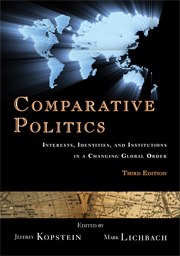Book contents
- Frontmatter
- Contents
- List of Maps
- Preface to the Third Edition
- List of Contributors
- 1 What Is Comparative Politics?
- 2 The Framework of Analysis
- PART ONE EARLY DEVELOPERS
- PART TWO MIDDLE DEVELOPERS
- PART THREE LATE DEVELOPERS
- PART FOUR EXPERIMENTAL DEVELOPERS
- 9 Mexico
- 10 India
- 11 Iran
- 12 South Africa
- 13 The European Union
- 14 Nigeria
- STOP AND COMPARE
- Index
STOP AND COMPARE
from PART FOUR - EXPERIMENTAL DEVELOPERS
- Frontmatter
- Contents
- List of Maps
- Preface to the Third Edition
- List of Contributors
- 1 What Is Comparative Politics?
- 2 The Framework of Analysis
- PART ONE EARLY DEVELOPERS
- PART TWO MIDDLE DEVELOPERS
- PART THREE LATE DEVELOPERS
- PART FOUR EXPERIMENTAL DEVELOPERS
- 9 Mexico
- 10 India
- 11 Iran
- 12 South Africa
- 13 The European Union
- 14 Nigeria
- STOP AND COMPARE
- Index
Summary
EARLY DEVELOPERS, MIDDLE DEVELOPERS, LATE DEVELOPERS, AND EXPERIMENTAL DEVELOPERS
Taken together, the chapters you have just read underscore the importance of domestic political responses to international political challenges. In fact, a different title for the book might well have been “Liberal Democracy and Its Challengers.” As we have seen, Britain and France developed first, each with its own institutional variation on the liberal democratic theme. This development, as positively as we may now evaluate it from our own perspective, made these two states powerful and ultimately threatening to Europe and the rest of the world.
Still, because of British and French successes, other countries sought to emulate the experience of the initial developers. In terms of our five-step framework: (1) While middle developers Germany and Japan reacted to British and French development, devising variations on the initial British and French innovations, they were never actually able to replicate them for the simple reason that they were trying to catch up from behind. (2) As middle developers, middle-class interests were weaker, nationalist identity more pronounced, and bureaucratic state-institutions stronger and democracy weaker. (3) These different circumstances of development ultimately weakened liberalism in Germany and Japan, which paved the way for the Nazi and fascist responses. It makes sense therefore to speak of a fascist path to the modern world. (4) The Nazis and the Japanese launched World War II, which ultimately led to occupation by the core liberal powers and a recasting of domestic identities, interests, and institutions.
- Type
- Chapter
- Information
- Comparative PoliticsInterests, Identities, and Institutions in a Changing Global Order, pp. 589 - 592Publisher: Cambridge University PressPrint publication year: 2008



